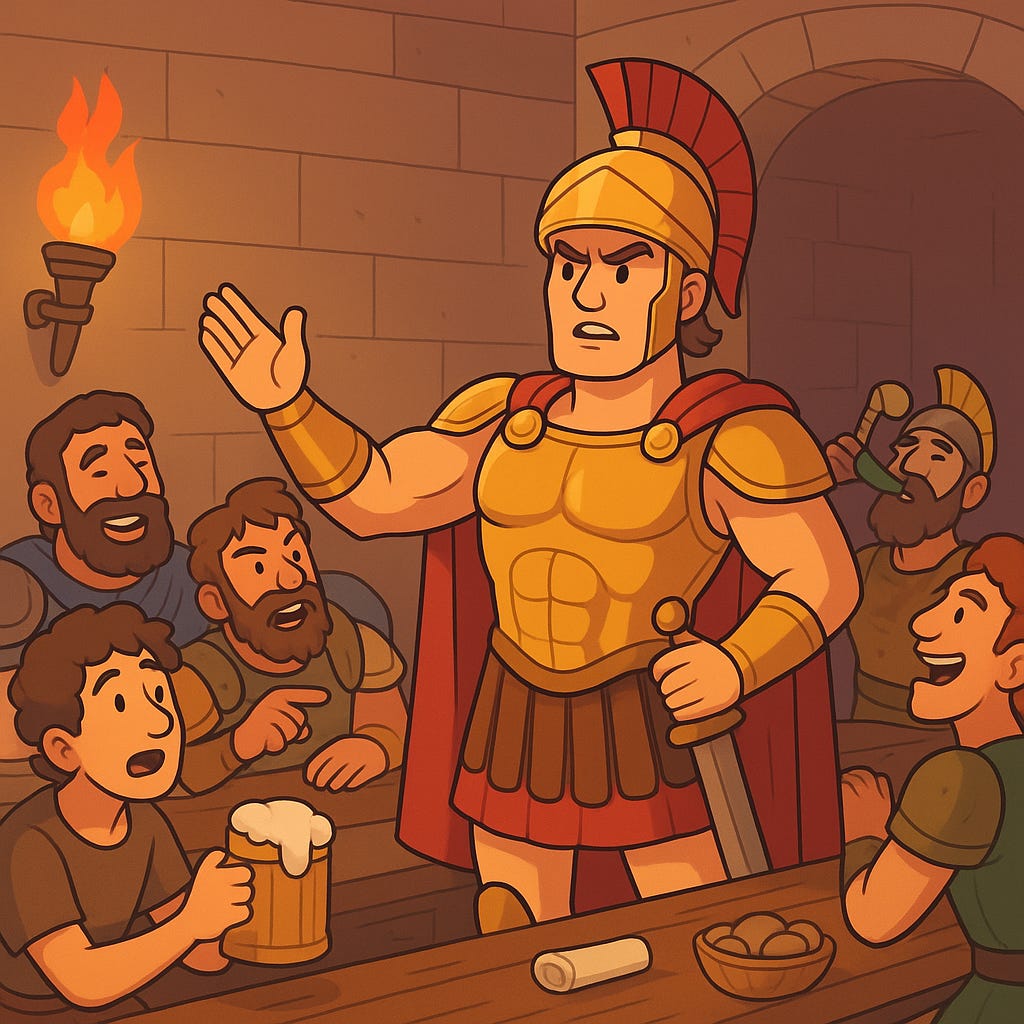Going Greek
Greek Life. ~650 words, 2 minute read. With Gemini.
The bronze doors boomed shut, the sound a dull thud in a hall already ringing with noise. The air was thick with the smell of spilled wine, roasting meat, and the sweat of a hundred men packed too tightly together. Alexander stood on the dais, the flickering torchlight sliding across the polished curves of his cuirass. Below, the long tables were a chaotic landscape of wild hair, bearded faces, and drinking horns raised in slurred toasts. He struck the butt of his spear against the stone floor. The sharp crack was just enough to cut through the din, creating a pocket of silence that was immediately threatened by a fresh wave of laughter.
“Brothers,” Alexander’s voice was not a shout, but a low rumble that vibrated through the floorboards. “The agenda is recruitment. We choose who is worthy to pledge the Companion Cavalry.”
A roar of approval, primal and joyous, swept the room. Across the hall, Cleitus, a man whose face was a tapestry of old scars, hauled himself onto a table, his sandals kicking over a jug of wine. He drained his horn in one long pull, the dark liquid running in rivulets through his beard. His triumphant bellow was the signal for the chaos to resume. Alexander’s jaw was a knot of muscle. He had pacified all of Thrace with less effort than it took to call a single chapter meeting to order.
“First,” Alexander said, his voice slicing through the noise, “a legacy from the upper plains. Hephaestion.”
Parmenion, Alexander’s vice president, leaned forward. His age showed in the silver of his beard, but his eyes were chips of flint. “A good family,” he said, his voice dry and raspy. “They breed the best horses in the north. The boy can ride before he can walk. His uncle, you’ll remember, was one of us.”
“A legacy!” a voice bellowed from the back, thick with sarcasm. “Is that all we are now? A club for our fathers’ sons? I say we need spears, not silver spoons!”
The hall fractured into a dozen different arguments. Men were on their feet, jabbing fingers at each other, their voices rising in a passionate cacophony. Alexander let the fire burn for a moment, his eyes scanning the room. He saw the old guard, men like Parmenion, who saw the fraternity as a matter of bloodline and tradition. He saw the younger ones, hungry and ambitious, who saw it only as a stepping stone to glory. He needed the foundation of one and the fire of the other.
“Enough,” Alexander commanded. The word was not loud, but it was sharp, and it carried the weight of absolute authority. The room settled, the arguments dying in men’s throats. “The vote. White stone for yes, black for no.”
Two initiates, their faces pale with nervous energy, scurried through the hall with heavy clay pots. The veterans tossed their stones in with deliberate clicks, some holding their choice up for all to see, a small act of defiance. When the pots were returned, Parmenion emptied them onto the table with the care of a priest reading entrails. He separated the stones, his thick fingers moving with surprising delicacy.
The two piles grew, neck and neck. For a long moment, it seemed they would be equal. The hall held its breath. Then, the last stone was sorted. White. A single vote had tipped the scale.
“Hephaestion is on the slate,” Alexander announced, his voice flat, betraying no emotion. The hall responded with a divided roar of cheers and groans. Alexander looked out at the sea of faces, the firelight dancing in their wild eyes. He pictured a boy in the quiet plains, practicing with a wooden sword, dreaming of a life he could not yet imagine. He was one of them now. Or he would be, if the hazing didn’t break him first.
Alexander reached for the next scroll. “Next name. Ptolemy.”
Curious how much is AI? Read the output here.


